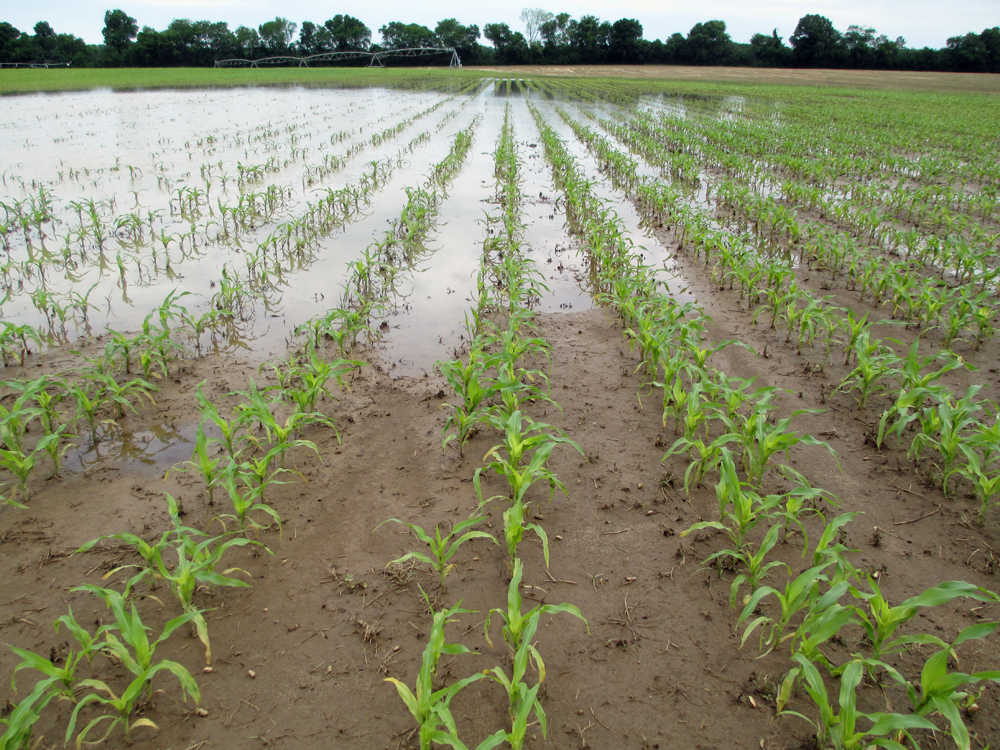
Jackson County received record rainfall in April 2014. The National Weather Service graphic below illustrates the wide variation of rainfall totals for April, with the areas in red receiving between 10-12″, the areas in pink 12-14″, the magenta, or hot pink 14-16″, and the highest totals in purple ranging from 16-18″. 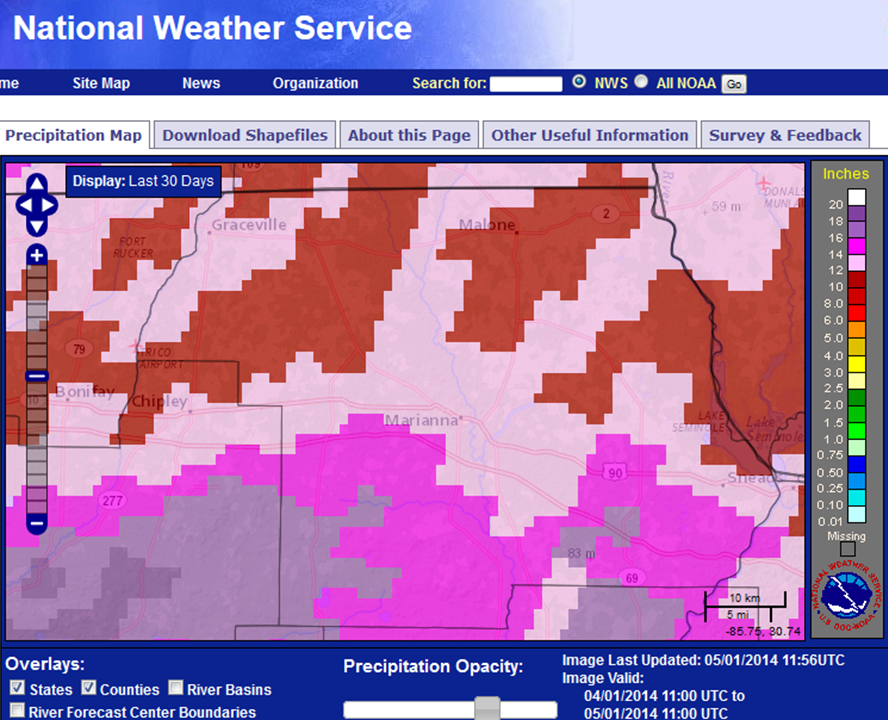 The 13.2” recorded in April of 2014 by the University of Florida FAWN Weather station was the most ever recorded in the 62 years of rainfall records kept at that location. The previous record, since they started keeping records in 1952, was 10.4” back in 1975. The 13.2” total was 8.9” above the historic average for April. Not only was the total amount of rain excessive, but it came in bunches: 2.7” fell April 5-7, 3.1” fell April 14-15, 4.5” fell April 17-19, and 3.9” fell April 29-30. The FAWN station recorded 7.7” of rainfall in March, so the two month total was just shy of 21”. Soils remained saturated during the two months that are key to both field preparation and early planting. Southern portions of the county received even higher rainfall totals than were recorded at the UF/IFAS Marianna FAWN weather station as indicated by the National Weather Service map that follows. A few areas received 16-18”, with most of the southern region receiving 14-16” of rainfall in the month of April.
The 13.2” recorded in April of 2014 by the University of Florida FAWN Weather station was the most ever recorded in the 62 years of rainfall records kept at that location. The previous record, since they started keeping records in 1952, was 10.4” back in 1975. The 13.2” total was 8.9” above the historic average for April. Not only was the total amount of rain excessive, but it came in bunches: 2.7” fell April 5-7, 3.1” fell April 14-15, 4.5” fell April 17-19, and 3.9” fell April 29-30. The FAWN station recorded 7.7” of rainfall in March, so the two month total was just shy of 21”. Soils remained saturated during the two months that are key to both field preparation and early planting. Southern portions of the county received even higher rainfall totals than were recorded at the UF/IFAS Marianna FAWN weather station as indicated by the National Weather Service map that follows. A few areas received 16-18”, with most of the southern region receiving 14-16” of rainfall in the month of April.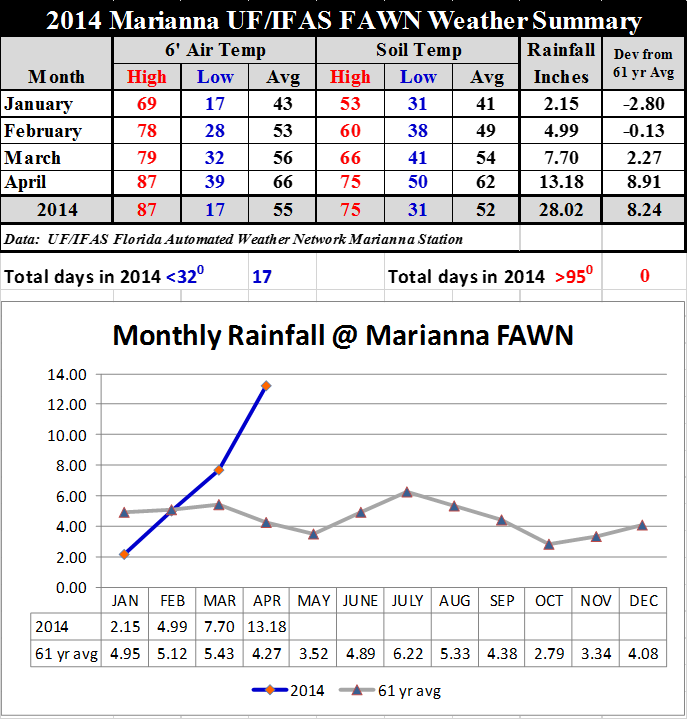
Not only was April an extremely wet month, but it was also unusually cool with an average soil temperature for the month of only 62 degrees. Peanuts and cotton seedlings flourish when average soil temperatures stay above 65 degrees. Early in the month of April the soil was still too cold for planting. Towards the end of the month when temperatures were more favorable, fields were too wet to plant.
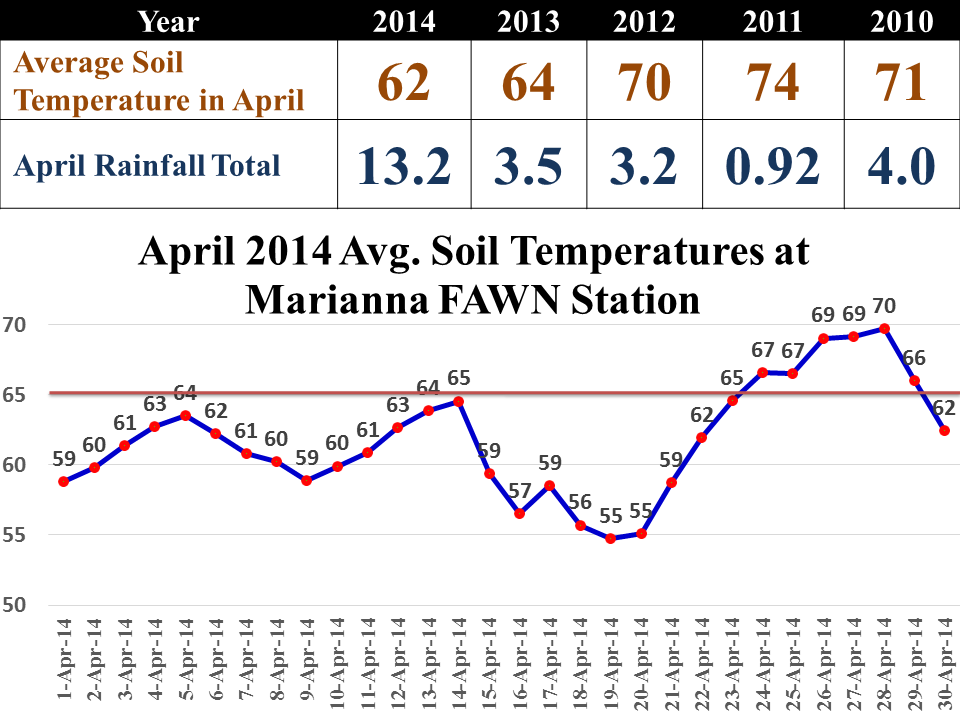
Some farmers were able to plant field corn, watermelons and other vegetables the second or third week of March. Much of these early planted crops have been slow to grow due to continuing cool soil temperatures, and the leaching out of fertilizer from heavy rains, and saturated soils. The early crops that were planted have had a very slow start.
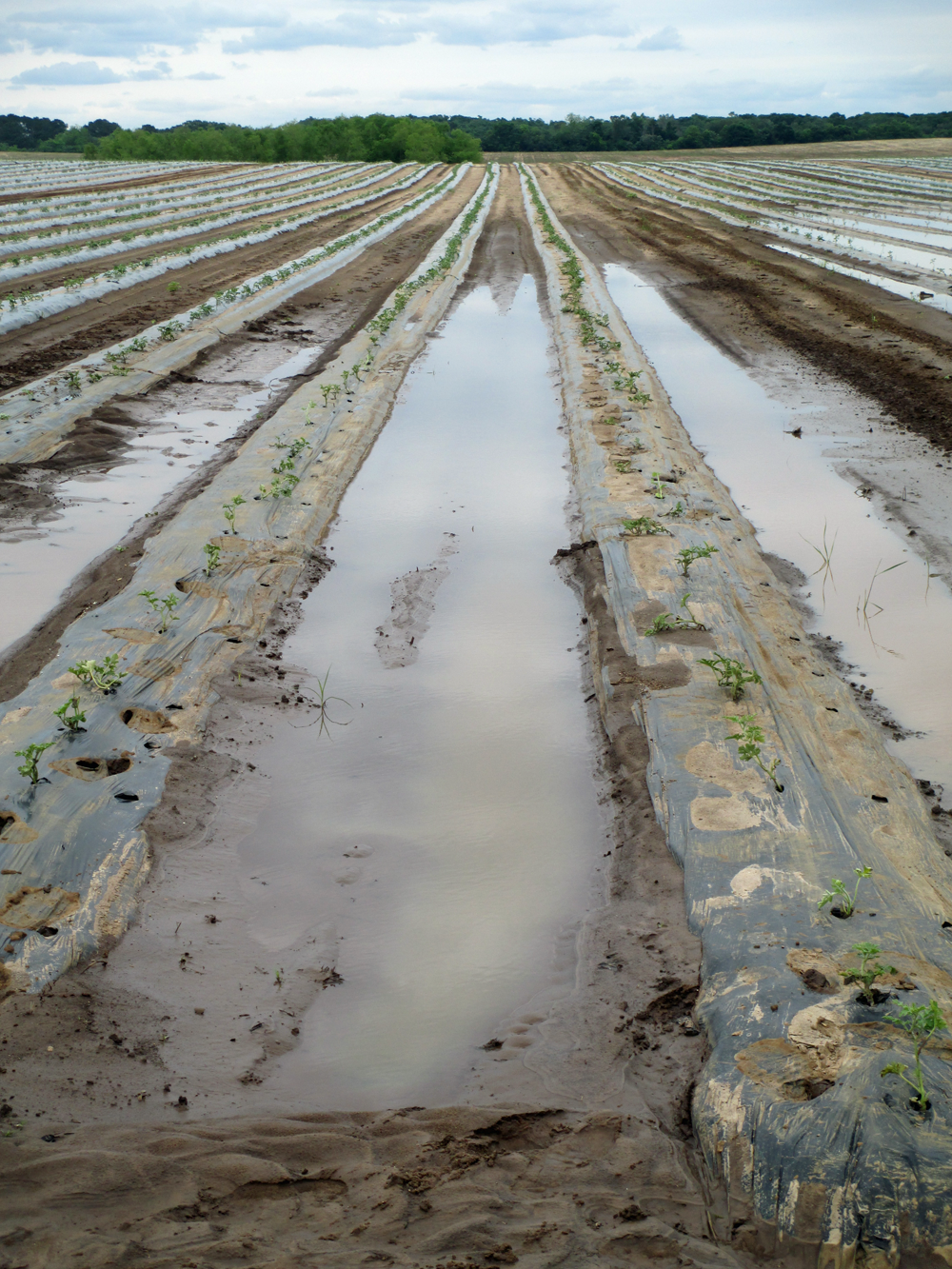
Pastures have also been affected by the abnormal weather conditions. The cooler weather has slowed the normal green-up and rapid growth normally seen in April each year. Late March and early April are traditionally the time when pastures receive annual fertilization. Much of the fertilizer that was applied was leached from repeated heavy rains. Cows, already thin from a cold winter fed poor quality hay produced following wet weather in 2013, were also affected by slow growing pastures in April. Grass quality is excellent, but the quantity is not adequate and hay supplies are nearly exhausted. Cattlemen depend on April pastures to finish the breeding season with improving cattle condition, but this was not attained this year. Reproduction rates and weaning weights will suffer as a result of the pasture conditions in April.
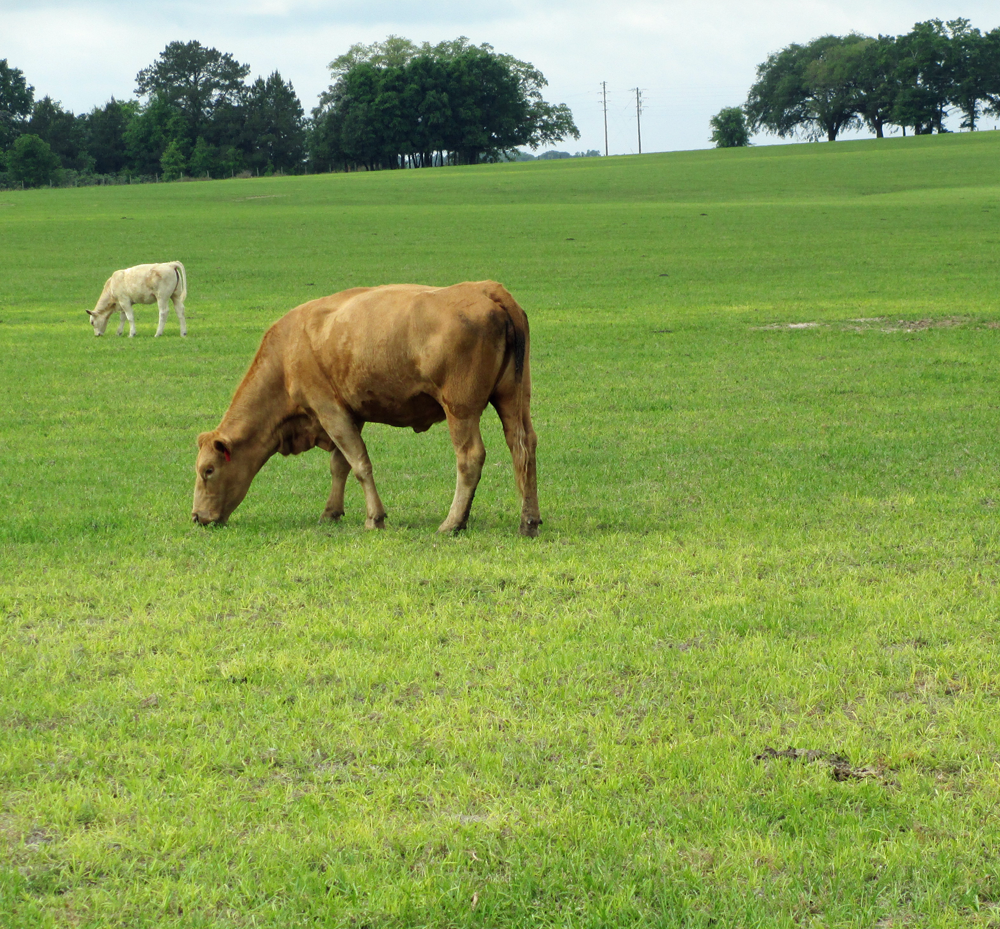
Rye, oats and wheat are grown in Jackson County either for grazing or grain harvest. The cool, wet conditions actually favored these crops being utilized for grazing, but those acres grown for grain have suffered. Fungal diseases, and a more serious issue of lodging caused by high winds and intense rain events flattened the crops in parts of the fields. Some fields suffered only minor losses from lodging, but others were more seriously damaged.
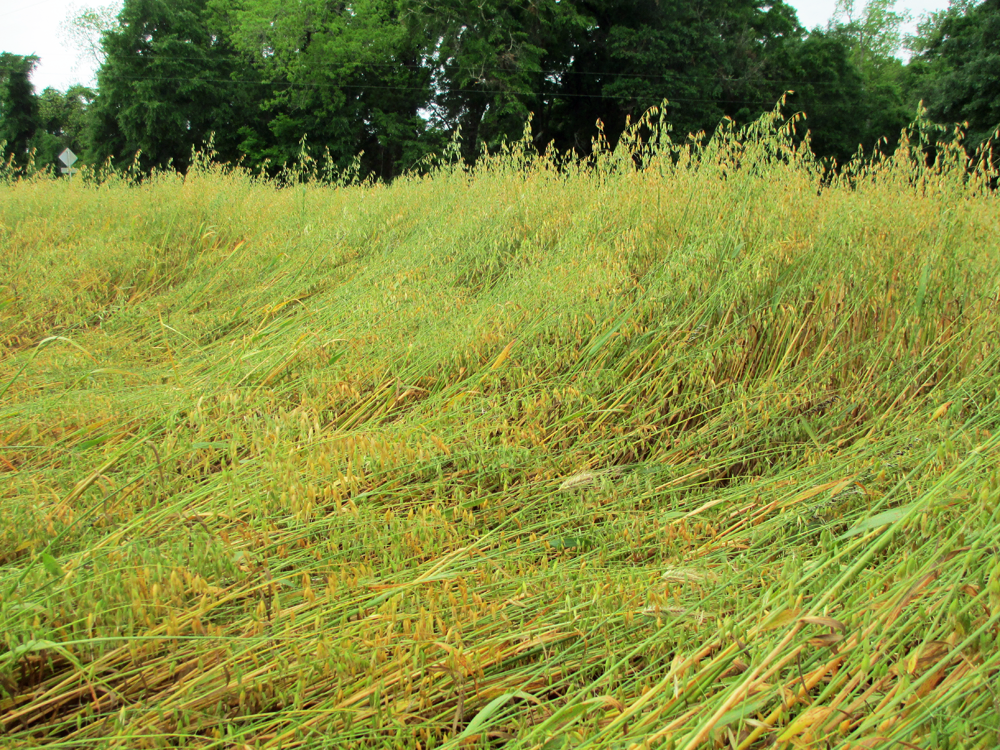
Many fields have not been planted at all, with field preparations being delayed 3-4 weeks by saturated soils. Intense rain storms caused rills and washes, which will require further field preparations adding more delays to the start of field planting. The top yields for cotton and peanuts come traditionally from fields planted in late April and early May. Most fields are not even ready to plant at the beginning of May, and will take as much as two to three weeks to dry out enough for equipment operation. Planting normally is at least a 4 week process, so I fully expect that some fields will not be planted until mid-June, significantly reducing yield potential of those fields. Low areas that are currently flooded, may not be able to be planted at all this season.
Cool and very wet conditions this spring will certainly have an impact on the crops and pastures grown in Jackson County in 2014. Delayed field preparation and planting may seriously reduce cotton and peanut yields possibly, depending on weather conditions in May. Pastures are 3-4 weeks behind normal production. Much of the nitrogen fertilizers applied to early-planted crops and pastures have been leached out of the root zone by periods of intense rainfall. Intense, heavy rains caused varying degrees of lodging for small grains grown for grain harvest. Melons and vegetables planted in late March could suffer from diseases caused from saturated soils, nutrient losses, and the inability for farmers to apply fungicides in a timely manner. Some acreage, in low, flooded areas may not be feasible to plant at all this year without an extended drying period over the next two months. Rivers and creeks that normally drain rural areas are swollen to flood stage, which will also slow the drainage system that normally dries farm fields following heavy rains.

 0
0
